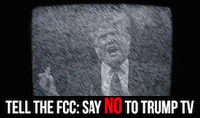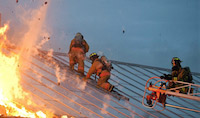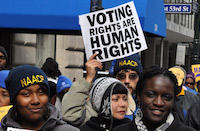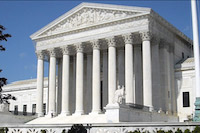Template:Mp-Featured Work
Featured Work |
|---|
Trump Ally Sinclair Moves to Consolidate TV EmpireNews rooms across the country are waiting anxiously to hear whether or not their takeover by Sinclair Broadcast Group will be approved by the Federal Communications Commission (FCC). Sinclair has until October 5th to respond to the latest FCC request for information about its pending $3.9 billion merger with Tribune Media Company, owner of 42 broadcast stations.Sinclair is controversial for its size — it's often been compared to the radio conglomerate Clear Channel — its unabashedly right-wing politics (which it pushes in the "must run" segments it forces all its stations to air) — and its close connections to the Trump White House. Read the rest of this item here. Consumer Product Safety Commission Cracks Down on Flame Retardants Linked to Health ProblemsThe U.S. Consumer Product Safety Commission (CPSC), the independent federal commission charged with product safety, voted on September 20, 2017 to take steps toward protecting consumers and firefighters from the hazards posed by the organohalogen class of flame retardants."The vote is a rare victory for health groups and a rare setback for industry groups during the first months of President Donald Trump's administration," writes the Chicago Tribune. The organohalogen class of flame retardants has been shown to leach from the products, or "migrate widely," resulting in human exposure. This class of chemicals have been found in the bodies of 97% of Americans says the Center for Disease Control. They have been linkedto cancer, neurological deficits, hormone disruption, and other health problems. Read the rest of this item here. Voter ID Suppressed the Vote Exactly as Wisconsin Republicans PredictedA new study of registered voters in Dane and Milwaukee Counties who did not vote in the 2016 presidential election found that approximately 17,000-23,000 eligible voters in those counties were prevented or deterred from voting by Wisconsin's voter ID law. Due to financial constraints, the social scientists were only able to do a study of two of Wisconsin's 72 counties, but the authors say that extrapolating statewide as many as 45,000 people stayed home because of the law.Donald Trump won the state of Wisconsin by only 22,000 votes, the first GOP presidential victory in the state since Ronald Regan in 1984. The shocking upset garnered national attention and helped deliver the electoral college to Trump as the popular vote went to Clinton. The study provides definitive evidence that the controversial voter ID bill, made it more difficult for targeted voters to cast their ballots. Read the rest of this item here. After Massive Giveaways to Industry, Mining Executives Will Spend Big at Trump's D.C. HotelThe chief executives of some of the largest coal and mining companies in the country have chosen the Trump International Hotel in Washington, D.C., for a private conference next month, according to documents obtained by The Intercept.The hotel is a natural venue for such an event. The host of the conference, the National Mining Association, an industry lobby group, has won a string of policy victories and carve-outs from the Trump administration and its Republican allies in Congress. The NMA board of directors meeting, which takes place October 3-4, is yet the latest example of a special interest group spending thousands of dollars on a property owned directly by the Trump family. The Trump International charges over $800 a night for the days the mining event is scheduled. Read the rest of this item here. SCOTUS Prepares to Hear Case that Could Put an End to Hyper-Partisan Gerrymandering and One Party RuleA case challenging the partisan gerrymandering of Wisconsin legislative districts will be heard by the U.S. Supreme Court on October 3. The court has a historic opportunity to curb the high-tech, gerrymandering that locks in one party control for at least a decade.Briefs have been filed on both sides, including one from the Center for Media and Democracy, and now a new poll shows that 71 percent of voters want to remove partisan bias from redistricting even if it means their party may not win as many seats. The voters have it right. They know that sophisticated, computer-aided gerrymandering, which can be undertaken by either party, strikes a mortal blow to democracy and competitive elections. Read the rest of this item here. |




